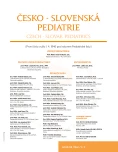-
Medical journals
- Career
Diagnostic methods in intestinal malrotation disorders
Authors: P. Omaník 1; M. Lacová 2; E. Murár 1; R. Koreň 1; J. Novotný 1
Authors‘ workplace: Klinika detskej chirurgie SZU a DFNsP, Banská Bystrica prednosta prof. MUDr. M. Vidiščák, PhD. 1; II. detská klinika SZU a DFNsP, Banská Bystrica prednosta prof. MUDr. K. Králinský, PhD. 2
Published in: Čes-slov Pediat 2014; 69 (5): 267-273.
Category: Original Papers
Overview
Introduction:
Intestinal malrotations in newborns are some of the most common congenital anomalies presenting with clinical symptoms. Their exact preoperative recognition despite using a wide range of imaging studies is very difficult, sometimes even impossible.Material and methods:
The authors analyzed retrospectively (within 12 months) a group of patients admitted to the Pediatric Surgery Department, Children's University Hospital in Banska Bystrica, who were operated on for ileus with confirmed intestinal malrotation intraoperatively. The analysis was focused on the contribution of radiological examination methods in the diagnostics.Results:
Five patients were operated on for intestinal malrotation during the period. 4 of them were neonates, one patient was 39 months old. The most relevant imaging studies proved so-called “dynamic ultrasound examination”, X-ray contrast enema (one case), contrast CT scan (one case). In contrary, the profit of conventional abdominal X-ray and standard ultrasound scans was almost negligible.Conclusion:
In addition to clinical finding surgeon relies on the results of radiological examinations in the intestinal malrotation diagnostics. Although the diagnostic accuracy of some of them is high, we have to realize, that these are auxiliary methods. The local clinical finding remains crucial in the indication of surgical intervention.Key words:
intestinal malrotation, ileus, acute abdomen, diagnostics
Sources
1. Mallick IH, Iqbal R, Davies JB. Situs inversus abdominus and malrotation in an adult with Ladd‘s band formation leading to intestinal ischaemia. World J Gastroenterol 2006; 12 (25): 4093–4095.
2. Emanuwa OF, Ayantunde AA, Davies TW. Midgut malrotation first presenting as acute bowel obstruction in adulthood: a case report and literature review. World J Emerg Surg 2011; 6 (1): 22.
3. Applegate KE, Anderson JM, Klatte EC. Intestinal malrotation in children: a problem-solving approach to the upper gastrointestinal series. Radiographics 2006; 26 (5): 1485–1500.
4. Bozlar U, Ugurel MS, Ustunsoz B, et al. CT angiographic demonstration of a mesenteric vessel „whirlpool“ in intestinal malrotation and midgut volvulus: a case report. Korean J Radiol 2008; 9 (5): 466–469.
5. Nataraja R, Mahomed A. A novel plain abdominal radiograph sign to diagnose malrotation with volvulus. J Radiol Case Rep 2010; 4 (5): 7–12.
6. Kloss BT, Patel R, Mackey J. Midgut volvulus in a 4-year-old male. Int J Emerg Med 2010; 3 (4): 523–524.
7. Mihál V, Michálková K, Malý T, et al. Biliární zvracení jako projev nonrotace s duodenální obsrukcí. Pediatr praxi 2008; 9 (5): 344–346.
8. Hsiao M, Langer JC. Surgery for suspected rotation abnormality: selection of open vs laparoscopic surgery using a rational approach. J Pediatr Surg 2012; 47 (5): 904–910.
9. Boráňová S, Žáčik M, Palíšek J. Laddův syndrom. Pediatr praxi 2012; 13 (4): 250–251.
10. Alkan M, Oguzkurt P, Alkan O, et al. A rare but serious complication of Ladd‘s procedure: Recurrent nidgut volvulus. Case Rep Gastroenterol 2007; 1 (1): 130–134.
11. Ortiz-Neira CL. The corkscrew sign: midgut volvulus. Radiology 2007; 242 (1): 315–316.
12. Sammour RN, Leibovitz Z, Degani S, et al. Prenatal diagnosis of small-bowel volvulus using 3-dimensional Doppler sonography. J Ultrasound Med 2008; 27 (11): 1655–1661.
13. Janda J, Sládková E, Zůnová J. Infekce močových cest u dětí a dorostu, novější údaje o etiologii, diagnostice a léčbě. Čes-slov Pediat 2010; 65 (12): 706–714.
Labels
Neonatology Paediatrics General practitioner for children and adolescents
Article was published inCzech-Slovak Pediatrics

2014 Issue 5-
All articles in this issue
- Diagnostic methods in intestinal malrotation disorders
- Beta-blockers in the treatment of hemangiomas in childhood
- The importance of classical cytogenetic examination in clinical paediatric practice: analysis of 384 indications
- Severe spontaneous intracranial bleeding in 11-months old boy with congenital afibrinogenemia
- Alveolar capillary dysplasia with misalignment of the pulmonary veins as a cause of hypoxemic respiratory failure in a term newborn
- The role of hepcidin in iron metabolism
- Ethical concerns involving the newborns at risk
- Czech-Slovak Pediatrics
- Journal archive
- Current issue
- Online only
- About the journal
Most read in this issue- Beta-blockers in the treatment of hemangiomas in childhood
- Ethical concerns involving the newborns at risk
- The role of hepcidin in iron metabolism
- Diagnostic methods in intestinal malrotation disorders
Login#ADS_BOTTOM_SCRIPTS#Forgotten passwordEnter the email address that you registered with. We will send you instructions on how to set a new password.
- Career

